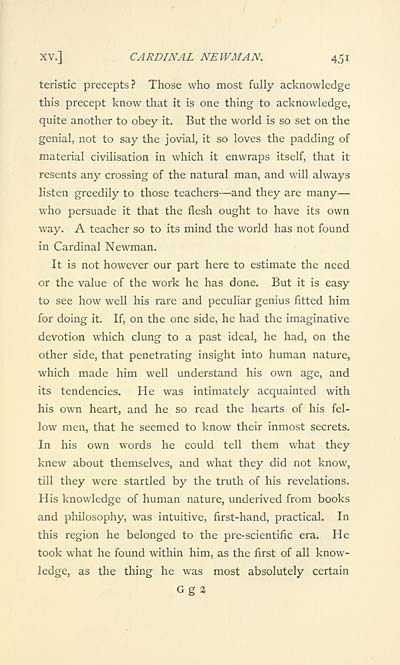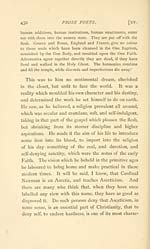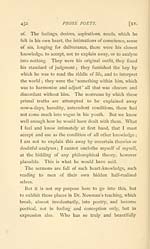Ossian Collection > Aspects of poetry
(467)
Download files
Complete book:
Individual page:
Thumbnail gallery: Grid view | List view

XV.] CARDINAL NEWMAN. 451
teristic precepts? Those who most fully acknowledge
this precept know that it is one thing to acknowledge,
quite another to obey it. But the world is so set on the
genial, not to say the jovial, it so loves the padding of
material civilisation in which it enwraps itself, that it
resents any crossing of the natural man, and will always
listen greedily to those teachers — and they are many —
who persuade it that the flesh ought to have its own
way. A teacher so to its mind the world has not found
in Cardinal Newman.
It is not however our part here to estimate the need
or the value of the work he has done. But it is easy
to see how well his rare and peculiar genius fitted him
for doing it. If, on the one side, he had the imaginative
devotion which clung to a past ideal, he had, on the
other side, that penetrating insight into human nature,
which made him well understand his own age, and
its tendencies. He was intimately acquainted with
his own heart, and he so read the hearts of his fel-
low men, that he seemed to know their inmost secrets.
In his own words he could tell them what they
knew about themselves, and what they did not know,
till they were startled by the truth of his revelations.
His knowledge of human nature, underived from books
and philosophy, was intuitive, first-hand, practical. In
this region he belonged to the pre-scientific era. He
took what he found within him, as the first of all know-
ledge, as the thing he was most absolutely certain
Gg3
teristic precepts? Those who most fully acknowledge
this precept know that it is one thing to acknowledge,
quite another to obey it. But the world is so set on the
genial, not to say the jovial, it so loves the padding of
material civilisation in which it enwraps itself, that it
resents any crossing of the natural man, and will always
listen greedily to those teachers — and they are many —
who persuade it that the flesh ought to have its own
way. A teacher so to its mind the world has not found
in Cardinal Newman.
It is not however our part here to estimate the need
or the value of the work he has done. But it is easy
to see how well his rare and peculiar genius fitted him
for doing it. If, on the one side, he had the imaginative
devotion which clung to a past ideal, he had, on the
other side, that penetrating insight into human nature,
which made him well understand his own age, and
its tendencies. He was intimately acquainted with
his own heart, and he so read the hearts of his fel-
low men, that he seemed to know their inmost secrets.
In his own words he could tell them what they
knew about themselves, and what they did not know,
till they were startled by the truth of his revelations.
His knowledge of human nature, underived from books
and philosophy, was intuitive, first-hand, practical. In
this region he belonged to the pre-scientific era. He
took what he found within him, as the first of all know-
ledge, as the thing he was most absolutely certain
Gg3
Set display mode to: Large image | Transcription
Images and transcriptions on this page, including medium image downloads, may be used under the Creative Commons Attribution 4.0 International Licence unless otherwise stated. ![]()
| Early Gaelic Book Collections > Ossian Collection > Aspects of poetry > (467) |
|---|
| Permanent URL | https://digital.nls.uk/78390876 |
|---|
| Description | Selected books from the Ossian Collection of 327 volumes, originally assembled by J. Norman Methven of Perth. Different editions and translations of James MacPherson's epic poem 'Ossian', some with a map of the 'Kingdom of Connor'. Also secondary material relating to Ossianic poetry and the Ossian controversy. |
|---|
| Description | Selected items from five 'Special and Named Printed Collections'. Includes books in Gaelic and other Celtic languages, works about the Gaels, their languages, literature, culture and history. |
|---|

